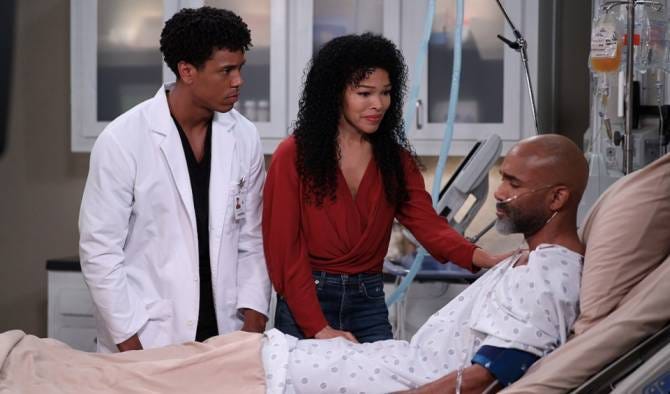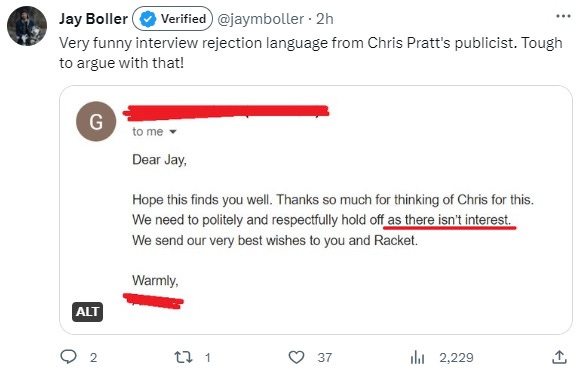Too Much TV: Your TV Talking Points For Wednesday, July 26th, 2023
Welcome to the world of the WGA's Fi-Core writers
Here's everything you need to know about the world of television for Wednesday, July 26th, 2023.
WELCOME TO THE WORLD OF THE WGA'S FI-CORE WRITERS
I wrote a quick mention yesterday of the news that the daytime soap General Hospital was reportedly hiring what was described as "temporary workers." I mentioned that I suspected the story was much more complicated than that, and wow, was a I correct in that assumption.
I posted a piece this morning on the history of daytime soaps using what are described as "Fi-Core" members of the WGA to keep cranking out episodes during a strike. You should really read the entire piece here, in part because it's a much better explanation of the issue than the one posted s few hours ago by Variety. That piece was basically just "yep, we've confirmed they're using new writers," without providing any of the context. And the history of the WGA's Fi-Core members is pretty fascinating:
The idea of fi-core members is not unique to the WGA and in fact, it comes out of a 1963 Supreme Court case - National Labor Relations Board Vs. General Motors - which decided that while employees could not be forced to become union members, they would be required to pay a "fee" that would cover a share of the union's collective bargaining costs. The ruling applies to every union in the United States, including the WGA
The WGA does rightfully note that the number of members who have opted to become Fi-Core is very small. Although it does include some well-known names. Including George Clooney, Tyler Perry, John Ridley, Garry Trudeau, Robert Rodriguez, Steven Soderbergh, and George Lucas.
There are a variety of reasons why these familiar names opted for Fi-Core status. Tyler Perry reportedly has a strong dislike of the WGA and its practices, while George Clooney became Fi-Core following the result of a WGA decision in a credit arbitration vote that he would not get screen credit on Leatherheads.
As I mentioned above, I think it's worth reading the entire piece and I would appreciate it you sharing it in your circle of friends who might find it of interest. Getting a wider distribution group when you're a smaller, independent journalist can be challenging.
I'll also have some follow-up pieces in the coming days, which will offer up some more specific details on what's happening behind the scenes of the few surviving daytime soaps.
ODDS AND SODS
* I have been distracting myself from the complexities of strike news coverage by reviewing some of this week's Shark Week specials. And here is the latest attempt, which takes a look at Alien Sharks: Strange New Worlds.
* Hulu has announced an as-yet untitled eight-episode series order for an unscripted series about Wayne Brady and his family.
* Much is being made today of the news that YouTube Premium has around 80 million paid subscribers. One part of that story that a lot of news reports are glossing over is that the number includes both YouTube Premium as well as YouTube Music subscribers. Which is a bit like touting the massive number of combined subscribers of Spotify and Fubo.
THIS IS AN INTERESTING PIECE OF CROSS-PROMOTION FROM VERIZON WIRELESS
SOME THOUGHTS ABOUT A POSSIBLE SOLUTION FOR THE WRITERS ROOM ISSUE
I enjoy speaking to business affairs executives, because they straddle that world between the creative class and the C-suite executives. They see the entertainment business in a very dispassionate way, which can be refreshing.
The Ankler has another column from an unnamed business affairs executive, who offers up a possible series of solutions for the challenging questions of writers rooms. As you may remember, the WGA is seeking to mandate a minimum size for writers rooms, while the studio side has no apparent intention of having that discussion.
This piece (subscription required) has some good insight into the thinking on both sides and while I don't agree with everything, I think these talking points would be a good place for both sides to start if they are serious about coming to a resolution of the strike before the Christmas break:
Prohibit Applying Pre-Greenlight Weekly Writing Fees Against Episodic Fees: Under the current rules, studios can negotiate to apply (or “credit”) a writer’s pre-greenlight weekly fees, in whole or in part (but usually 50 percent), against the writer’s total episodic compensation for the season should the series be ordered to production. Not every studio even tries this. I don’t personally know of any that strictly require it. And the math to account simultaneously for scale minimums, span calculations, and applicability can be tricky, such that in some cases, the studio gets no functional benefit from this right. But it’s odious to writers and their representatives, and while I admit to having happily and successfully negotiated for this many times, it now strikes me as petty and unnecessary.
Higher Scale Minimums for Pre-Greenlight Rooms: Okay, I admit the parties are already negotiating on this issue. But that’s good, because it feels like a no-brainer — it’s just a matter of setting the premium. The union has sought a 25 percent premium on weekly scale for writers in all pre-greenlight rooms, including between seasons, while the AMPTP has (at least according to the WGA) offered a 5 percent premium for “development room” services, applicable only when three or more writers (including teams) are hired for 10 or fewer weeks before the premiere season of a series. If that’s accurate, I tend to think the right result here looks a lot more like the WGA’s proposal than the AMPTP’s. I also suspect this is an area where the studios have reserved some space to maneuver once negotiations resume.
We seem to still be in the part of the discussion where both sides are just talking past each other. Which is depressing given how long the writers have been out on strike.
TWEET OF THE DAY
THE CRAZY WORLD OF SAG-AFTRA RESIDUALS
I thought digging through the side letters and other documentation of the basic minimum agreement between the WGA and AMPTP was complicated. That is, until I start doing the same for SAG-AFTRA. There are so many quirks of the contracts, some related to the awkward merging of the two unions and some of them because of the money (or lack thereof) that is included in aspects of the current agreement.
For instance, you have no doubt seen actors who starred on long-running broadcast TV shows that are now streaming. "See, I only made <insert tiny amount> and the show that I was on was one of the most popular titles on the streamer!"
While I still trying to parse all of the financial complications of how this works, there are a couple of things at play here. First, if you are/were on a broadcast show that is now streaming on "new media" (which in most cases is an SVOD), then your residuals are not based on the show's popularity. They are based on a small percentage of the licensing fee paid by the streamer to the studio which owns the show. And it's not a large percentage - the current deal calls for 3.6% of the licensing fee for SAG and that is generally split between all the cast members who qualify. Which can be a number of people on a show with a large ensemble.
Here is a VERY hypothetical situation. Let's assume the show you're on ends up being licensed to Netflix for $100,000 an episode. 3.6% of that is $3,600, split ten ways. $360. That is before any other fees are deducted. So it's true that it's not a lot of money.
And this is also why the studios refuse to entertain the idea of streamers paying a percentage of their revenue to actors. They argue that they aren't responsible for making sure the actors receive reasonable compensation. They paid a licensing fee to the studio and the studios could always agree to give up a larger percentage of that fee in order to help out struggling SAG-AFTRA members.
Granted, this is similar to the “they’re not our employees, they’re contractors” excuse that is frequently used by big businesses in all industries. But I digress…
I am working on an FAQ for all of this and yes, it is making my head hurt.
WHAT'S NEW TODAY AND TOMORROW:
WEDNESDAY, JULY 26TH:
* After The Bite (HBO)
* Air Jaws: Final Frontier (Discovery)
* Baki Hanma (Netflix)
* Big Brother: 25th Anniversary Celebration (CBS)
* Cocaine Sharks (Discovery)
* Florida Shark: Blood In The Water (Discovery)
* Missing: The Lucie Blackman Case (Netflix)
* My Strange Arrest Series Premiere (Netflix)
* The Great British Baking Show: The Professionals Season Seven Premiere (Netflix)
*The Hardy Boys (Hulu)
THURSDAY, JULY 27TH:
* Agatha Christie's Hjerson Series Premiere (Topic)
* Beware The Night Nurse (LMN)
* Happiness For Beginners (Netflix)
* Harley Quinn Season Premiere (Max)
* Jaws In The Shallows (Discovery)
* Looney Tunes Cartoons Season Premiere (Max)
* Monster Mako: Fresh Blood (Discovery)
* Mother Undercover (Hulu)
* Paradise (Netflix)
* Shark Vs Snake: Battle Of The Bites (Discovery)
* The Croods: Family Tree Season Premiere (Hulu/Peacock)
* The Dragon Prince: Mystery Of Aaravos Season Five Premiere (Netflix)
* The Kardashians Season Finale (Hulu)
* The Heiress And The Heist (Sundance Now)
* The Lady Of Silence: The Metaviejitas Murders (Netflix)
* The Murderer (Netflix)
* The Slumber Party (Disney)
* The Witcher Season Premiere (Netflix)
* Today We'll Talk About That Day (Netflix)
* Twisted Metal Series Premiere (Peacock)
* The Witcher (Netflix)
* Zoey 102 Series Premiere (Paramount+)
Click Here to see the list of all of the upcoming premiere dates for the next few months.
SEE YOU THURSDAY!
If you have any feedback, send it along to Rick@AllYourScreens.com and follow me on Twitter @aysrick.





